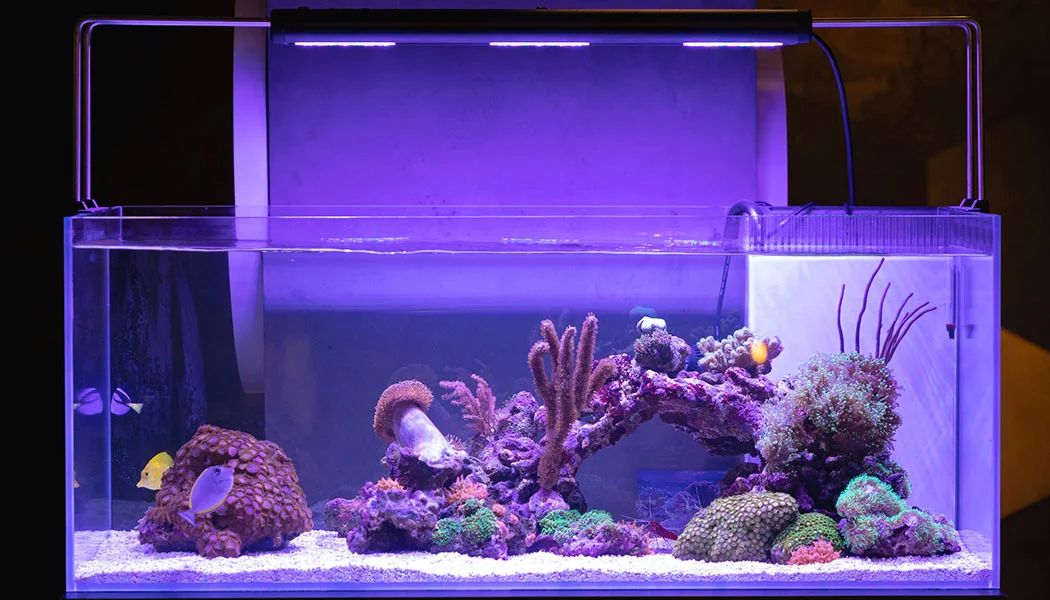There are major mental and physical benefits of an aquarium. Home saltwater and freshwater aquariums have surged in popularity since COVID-19. They are now more than a focal point in your house.
I remember looking at my first home aquarium. I had a curious feeling when I was a kid. Watching the fish swim around, I stood there for hours. Now I have a 150 gallon aquarium.
I’m going to discuss the benefits of owning an aquarium and how it can improve your mental and physical health.
Table of Contents
Key Takeaways
- Stress Reduction: Aquariums help lower stress and anxiety levels.
- Improved Mood: The vibrant colors and movements of fish provide a sense of purpose.
- Educational Value: Aquariums offer hands-on learning about marine biology, ecology, and environmental science.
- Physical Health Benefits: Watching aquariums can lower blood pressure and heart rate. This can promote better cardiovascular health.
- Aesthetic and Social Benefits: Aquariums enhance home decor and serve as conversation starters. This can bring friends and families together.
Aquarium Mental Health Benefits
Stress Reduction
A study by Nancy Gee has found multiple stress reduction benefits. Viewing a live fish tank decreases stress, elevates mood, and increases relaxation. You’ll find public aquariums in settings such as:
- Waiting rooms
- Offices
- Hospitals
- Libraries
- Therapy and counseling centers
- Schools and educational institutions
These environments can be stressful. Having an aquarium helps create a more relaxing atmosphere.

Improved Mood
Aquariums not only reduce stress but also improve mood. The vibrant colors of the fish and the movements can be stimulating and uplifting. This visual appeal helps create a positive and engaging environment.
One way to brighten your day is to watch you fish swim. Watch them go inbetween the rocks and through the caves, it’s the best.
For many people, the presence of an aquarium brings joy and a sense of excitement. The act of feeding the fish and maintaining the tank can also provide a sense of purpose and routine. This can be helpful for those individuals struggling with mental health issues.
Enhancement of Focus and Creativity
Aquariums also play a significant role in enhancing focus and creativity. They provide a focal point that can help individuals concentrate on the tasks at hand. This is beneficial in workspaces and study areas where maintaining focus is crucial.
The gentle movements of the fish can be mesmerizing. Offering a brief, calming distraction that can help to reset and refresh the mind.
To enhance focus, aquariums can also stimulate creative thinking. The dynamic and ever-changing environment within the tank encourages observation and reflection. This can lead to increased creativity and problem-solving abilities. Creative professionals find that having an aquarium nearby helps them think more clearly. This can help come up with more innovative ideas.
Aquarium Physical Health Benefits
Reduced Blood Pressure and Heart Rate
Research from PLOS One shows that observing fish can reduce blood pressure. The tranquil movements of fish and the gentle sound of bubbling water can help your heart rate. This relaxation response contributes to overall cardiovascular health.
Therapeutic Effects
Aquariums are effective tools in therapeutic settings.
- For patients with Alzheimer’s, the presence of an aquarium will improve mood. By lowering stress and anxiety.
- Children with autism benefit from sensory engagement. The calming behavior of watching fish helps improve focus.
- In rehabilitation settings, aquariums offer a positive distraction from pain and discomfort. Aiding in pain management and emotional support.
The therapeutic impact of aquariums extends beyond physical health. Promoting a healing environment and enhancing emotional and psychological well-being.

Educational Benefits
Learning Opportunities
Aquariums offer a hands-on way to learn about marine biology. Children can observe fish behavior, learn about different species, and understand aquatic ecosystems.
Engaging with aquariums fosters a sense of responsibility in children. Tasks like feeding the fish, maintaining water quality, and ensuring the health of the tank’s inhabitants. This direct interaction encourages curiosity and scientific inquiry.
Activities:
- Observation: Watching the tank and noting behaviors.
- Research: Identifying species and learning about their natural habitats.
- Maintenance: Cleaning the tank and monitoring water parameters.
Raising Awareness
Owning an aquarium enhances awareness about aquatic ecosystems and the need for conservation. It highlights the delicate balance required to maintain these ecosystems. This shows the impacts of human activities on aquatic life.
This awareness encourages sustainable practices. Such as responsible sourcing of fish and coral, and educating individuals on the importance of biodiversity.
Practices:
- Conservation Efforts: Supporting and learning about marine conservation initiatives.
- Sustainable Sourcing: Choosing captive-bred fish and avoiding wild-caught species.
- Eco-friendly Products: Using environmentally safe cleaning and maintenance products.
Social and Aesthetic Benefits

Enhancing Home Decor
Home aquariums are a stunning addition to home decor, adding life and color to any room. They offer various designs and customization options. This makes it easier to match personal style and preferences.
From sleek, modern tanks to more traditional setups. Aquariums will complement any interior design. The vibrant colors of the fish and the aesthetic appeal of the coral will create a dynamic focal point.
Customization Options:
- Modern: Sleek designs with clean lines and minimalistic elements.
- Traditional: Classic setups with ornate stands and natural decor elements.
- Thematic: Tanks designed around specific themes, such as biotopes or aquascapes.
Social Interaction
Aquariums are a great focal point for social gatherings, sparking conversations and interest. The unique setup and variety of fish can provide a natural conversation starter.
Home aquariums can bring families together through shared activities and enjoyment. This collective engagement fosters bonding and creates shared experiences.
Family Activities:
- Observation and Enjoyment: Encourages relaxation and shared appreciation of nature.
- Feeding the Fish: Teaches responsibility and offers a daily shared routine.
- Tank Maintenance: Provides opportunities for teamwork and collaboration.
Practical Benefits

New Aquarium Routine and Responsibility
Maintaining an aquarium requires regular care, instilling a sense of routine and responsibility. Feeding fish, cleaning the tank, and monitoring water quality need to be consistent.
This routine can be a rewarding hobby. Providing a sense of accomplishment as the tank thrives under diligent care. These activities can help develop time management skills and discipline.
Daily Schedule
- Feeding Fish
Weekly Schedule
- Clean the Glass
- Water Changes
- Clean Protein Skimmer
- Switch Filter Sock(s)
Monthly Schedule
- Clean Equipment
- Replace Carbon and Chemical Media
Advantages of an Aquarium
Aquariums provide advantages, making them an attractive addition to any home. They offer a peaceful and low maintenance pet ownership experience. While enhancing home decor and providing educational value. Here are some key advantages of having an aquarium:
- Low Noise: Fish do not make disruptive sounds.
- Low Attention: Requires less frequent attention compared to traditional pets.
- Space Efficient: Suitable for small living spaces such as apartments.
- Allergy Friendly: Ideal for individuals with allergies, as pet fish produce no dander.
- Stress Relief: Watching the tank can have effects on reducing stress and types of anxiety.
- Educational Value: Offers learning opportunities about marine biology, ecology, and environmental science.
- Decorative Appeal: Adds aesthetic value to home decor with vibrant colors and dynamic movements.
- Health Benefits: Can lower blood pressure and heart rate. Contributing to overall cardiovascular health.
- Social Interaction: Acts as a focal point for social gatherings and conversations.
Disadvantages of an Aquarium
While aquariums offer many benefits, they also come with certain drawbacks that owners should consider. Here are some disadvantages of maintaining an aquarium:
- High Initial Cost: Setting up an aquarium can be expensive due to the cost of the tank, equipment, and fish.
- Regular Maintenance: Requires consistent upkeep, including cleaning, water changes, and equipment checks.
- Limited Interaction: Fish do not provide the same level of interaction or companionship as other pets.
- Potential for Disease: Aquatic life is susceptible to diseases that can be difficult and costly to treat.
- Noise from Equipment: Filters, air pumps, and other equipment can create noise.
- Water and Electricity Usage: Aquariums consume water and electricity. This will lead to higher utility bills.
Frequently Asked Questions
What are the benefits of an aquarium?
Aquariums offer several benefits:
- Stress Reduction: They lower stress and anxiety levels.
- Improved Mood: The dynamic movements of fish enhance mood and provide a sense of purpose.
- Educational Value: They provide hands-on learning about marine biology, ecology, and environmental science.
- Physical Health Benefits: Watching aquariums has been shown to lower blood pressure and heart rate.
- Aesthetic and Social Benefits: Aquariums add to home decor and serve as a conversation starter.
Is it good to have an aquarium in the house?
Yes, it is good to have an aquarium in the house. Aquariums offer mental and physical health benefits. They can serve as a calming focal point and a source of joy and engagement.
Is having an aquarium worth it?
Yes, having an aquarium is worth it. Despite the initial costs and regular maintenance, the benefits to mental and physical health.
Are aquariums good for mental health?
Yes, aquariums are good for mental health. They help lower stress and anxiety, improve mood, focus, and creativity. The calming effect of watching fish swim can lead to lower cortisol levels.
Why are aquariums so calming?
Aquariums are calming because of the movements of fish and the gentle sound of water. These elements create a soothing environment. The visual appeal of aquariums also engages the mind.
Are fish tanks good for ADHD?
Yes, tanks can be beneficial for individuals with ADHD. The sensory engagement can help improve focus. The changing environment can provide a gentle distraction, aiding in attention and concentration.
 Mixed Reef Tank
Mixed Reef Tank

